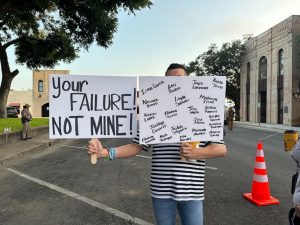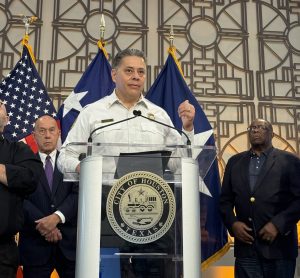A federal judge in El Paso issued a temporary restraining order stopping Texas Gov. Greg Abbott from carrying out his executive order restricting migrant travel in the state.
The Department of Justice asked for a temporary restraining order to keep Abbott from using state troopers to stop vehicles suspected of transporting migrants. District Judge Kathleen Cardone granted that request on Tuesday.
A Justice Department attorney in a hearing Monday argued Texas attempted to unlawfully create its own “immigration regime.” Immigration policy is under the purview of the federal government.
Attorneys for the state told the judge that the governor’s executive order is about COVID-19 health concerns and not immigration. The temporary restraining order is in effect until August 13, and the judge may extend it.
“The Court’s recent order is temporary and based on limited evidence,” Abbott’s office said in a statement Tuesday. “We look forward to providing the Court with the evidence to support the Governor’s Executive Order to protect Texans.”
The case comes amid a resurgence of the coronavirus with the spread of the Delta variant. The Abbott administration has restrained Texas communities from instituting mask or vaccine mandates while focusing his COVID rhetoric on the border region.
There were more than 188,000 attempted crossings from Mexico into the U.S. in June, the highest in a decade.
Abbott has said that he thinks the federal government was doing a better job of securing the border under former President Donald Trump, so he had Texas step in earlier this year to bolster the response.
In May, he issued a disaster declaration because, he said, illegal crossings “posed an ongoing and imminent threat of disaster.”
Weeks later, he announced he would continue to build the border wall that Trump made central to his presidency. But Abbott went a step further, saying that he would arrest as many people as possible who cross by charging them with state crimes like trespassing and vandalism.
Last week, Abbott ordered the Texas National Guard to begin assisting state troopers with those arrests.
Immigrant rights activists said Abbott’s latest order directing state troopers to stop any vehicles suspected of transporting migrants — which is now temporarily paralyzed by Tuesday’s restraining order — is illegal for a number of reasons, including the fact that it invites racial profiling.
“The state of Texas is using state jails to incarcerate immigration violators, arresting people, immigrants, under the theory of trespass … These are very, very problematic. And I would say, It invites a constitutional catastrophe,” said Geoffrey Hoffman, director of the University of Houston’s immigration clinic.
Hoffman recently published a piece for the Yale Journal on Regulation listing the limitations of state immigration enforcement activities. He noted that Arizona tried to pass state laws turning federal immigration law into state violations in 2012. They lost more than they won. Texas’ attempts to incrementally usurp federal authority, he said, also likely won’t work.
“The issue there in Arizona was that immigration enforcement is exclusively a federal matter. It’s not for the states to do,” he explained.
Michael Greenberger at the University of Maryland said Texas is a little different than Arizona, since the state is using existing laws.
“I think he would have an argument that he’s protecting the sovereignty of the state’s borders, by having people who are not allowed to come into the state,” Greenberger said.
He explained that the problem is that despite Abbott threading the needle in some ways to frame it in state law terms, the governor is constantly arguing in interviews that Texas is enforcing federal law because the Biden administration can’t — that sounds a lot like the Arizona case. And those comments would all be admissible in court.
“The temporary halt is really important because it’s a clear recognition of the legality of this order. And as the case progresses, it’s a signal as to where the judge is standing and what they’re looking at, based on the law in front of them,” said Rochelle Garza, a civil rights attorney. “So ultimately, we can expect that the executive order will be struck down as unconstitutional.”
Source: www.houstonpublicmedia.org










